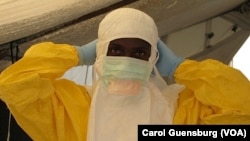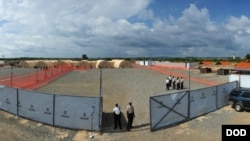The World Health Organization reports the spread of Ebola is having a damaging impact on the delivery of health services for people suffering from other illnesses in the three severely affected Ebola countries in West Africa. And it says one of the root causes of the rapid spread of Ebola in the region is linked to the weakness in the health systems of the three heavily infected countries.
Ebola has killed about 6,000 people. But WHO Coordinator of Health Systems, Dr. Gerard Schmets said the deaths of many more people suffering from malaria, chronic diseases and other illnesses probably can be linked to Ebola.
He said Ebola has damaged the delivery of general services in Guinea, Sierra Leone and Liberia. For example, he noted health workers who are caring for Ebola patients are no longer available to work in ordinary health care centers, disrupting important services such as vaccination programs.
“For example, pregnant women do not have access to the care they need. Pregnant women do not have access to health centers simply because the health centers are closed, because we do not have staff in these health centers anymore. In Guinea, for example, the general consultations and the hospitalization rates have dropped by 50 percent,” said Schmets.
Weakened health systems
Schmets noted that health systems in the three countries were very weak well before Ebola struck. For example, in pre-Ebola days Sierra Leone had 0.2 doctors per 10,000 inhabitants compared to 2.5 in the rest of Africa and 14 doctors per 10,000 inhabitants in the rest of the world.
He said the impact of the epidemic on already shaky health systems is huge and must be urgently addressed.
“We need clearly to focus on Ebola response. We need clearly to focus on rebuilding the general services, but we need also to focus on making the system resilient, to making the system stronger to resist the future epidemics or any disasters in the future,” said Schmets.
The World Health Organization is organizing a meeting next week in Geneva focused on building resilient health systems in Ebola affected countries. Major financial institutions including the World Bank and the African Development Bank will participate, as will ministers of health and finance from Liberia, Sierra Leone and Guinea.
Important technical agencies and non-governmental organizations operating in the region also will contribute to creating an action plan.











